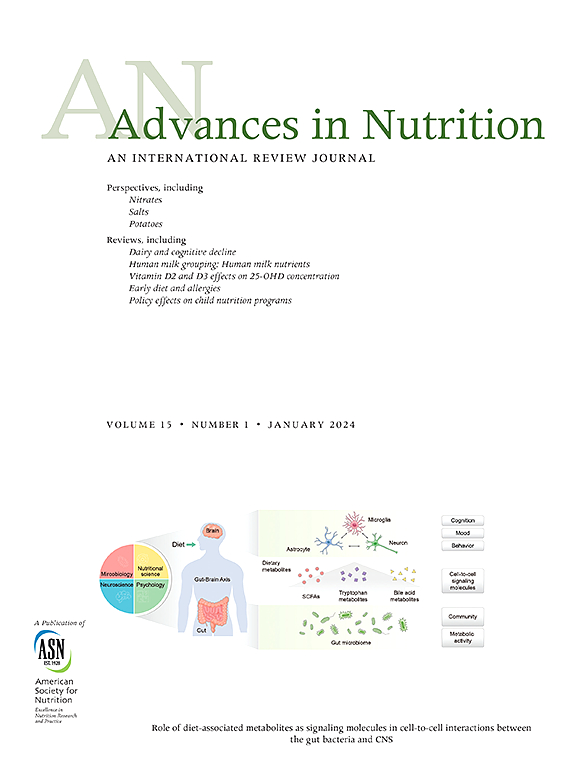高收入国家与饮食有关的健康不平等:观察性研究的范围审查
IF 9.2
1区 医学
Q1 NUTRITION & DIETETICS
引用次数: 0
摘要
背景:与饮食有关的健康不平等是高收入国家持续存在的公共卫生挑战,对社会和经济上处于不利地位的人群造成了不成比例的影响。目的:通过对观察性研究的范围审查,绘制高收入国家饮食相关健康不平等的现有证据,确定受影响最大的人群和健康社会决定因素的关键饮食结果。方法:系统检索MEDLINE、Web of Science、Scopus和Embase,检索2011年1月至2021年3月间发表的观察性研究。符合条件的研究通过至少一个PROGRESS-Plus决定因素来评估饮食相关的健康结果。我们遵循PRISMA-ScR指南,并在PROSPERO注册了审查(CRD42021234567)。根据PROGRESS类别对数据进行了专题图表和分析。结果:共纳入163项研究。大多数研究集中在教育、社会经济地位和居住地,而较少涉及性别认同、性取向或残疾。常见的饮食指标包括水果和蔬菜摄入量、饮食模式和食物组消费。证据一致表明,较低的教育水平和收入水平与较差的饮食结果有关。值得注意的是,某些人口群体(如少数民族、农村居民、教育或收入低的个人)经历了累积的不利条件。结论:范围审查强调了高收入国家中持续存在的和交叉的饮食相关的健康不平等。它强调了在监测、研究和决策方面需要标准化指标和交叉方法。本文章由计算机程序翻译,如有差异,请以英文原文为准。
Diet-Related Health Inequalities in High-Income Countries: A Scoping Review of Observational Studies
Diet-related health inequalities are a persistent public health challenge in high-income countries, disproportionately affecting socially and economically disadvantaged populations. This study aims to map the existing evidence on diet-related health inequalities in high-income countries through a scoping review of observational studies, identifying populations most affected and key dietary outcomes across social determinants of health. We conducted a systematic search of MEDLINE, Web of Science, Scopus, and Embase for observational studies published between January 2011 and March 2021. Eligible studies assessed diet-related health outcomes stratified by ≥1 Place of Residence, Race/Ethnicity, Occupation, Gender/Sex, Religion, Education, Socioeconomic Status, and Social Capital (PROGRESS)-Plus determinant. We followed Preferred Reporting Items for Systematic Reviews and Meta-Analyses Extension for Scoping Reviews guidelines and registered the review with International Prospective Register of Systematic Reviews (CRD42021234567). Data were charted and analyzed thematically according to PROGRESS categories. A total of 163 studies were included. Most studies focused on education, socioeconomic status, and place of residence, whereas fewer addressed gender identity, sexual orientation, or disability. Common dietary indicators included fruit and vegetable intake, dietary patterns, and food group consumption. Evidence consistently showed that lower education and income levels were associated with poorer dietary outcomes. Notably, certain population groups (for example, ethnic minorities, rural residents, and individuals with low education or income) experienced cumulative disadvantages. The scoping review highlights persistent and intersecting diet-related health inequalities in high-income countries. It underscores the need for standardized indicators and intersectional approaches in monitoring, research, and policy making.
求助全文
通过发布文献求助,成功后即可免费获取论文全文。
去求助
来源期刊

Advances in Nutrition
医学-营养学
CiteScore
17.40
自引率
2.20%
发文量
117
审稿时长
56 days
期刊介绍:
Advances in Nutrition (AN/Adv Nutr) publishes focused reviews on pivotal findings and recent research across all domains relevant to nutritional scientists and biomedical researchers. This encompasses nutrition-related research spanning biochemical, molecular, and genetic studies using experimental animal models, domestic animals, and human subjects. The journal also emphasizes clinical nutrition, epidemiology and public health, and nutrition education. Review articles concentrate on recent progress rather than broad historical developments.
In addition to review articles, AN includes Perspectives, Letters to the Editor, and supplements. Supplement proposals require pre-approval by the editor before submission. The journal features reports and position papers from the American Society for Nutrition, summaries of major government and foundation reports, and Nutrient Information briefs providing crucial details about dietary requirements, food sources, deficiencies, and other essential nutrient information. All submissions with scientific content undergo peer review by the Editors or their designees prior to acceptance for publication.
 求助内容:
求助内容: 应助结果提醒方式:
应助结果提醒方式:


